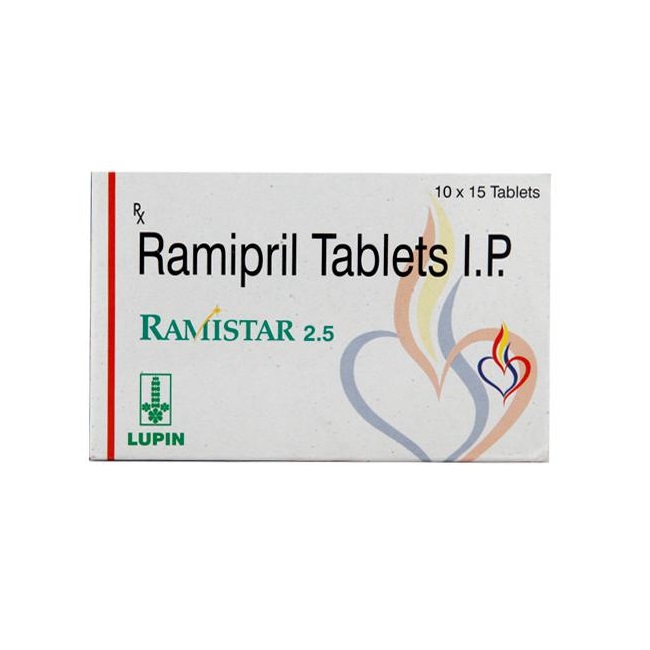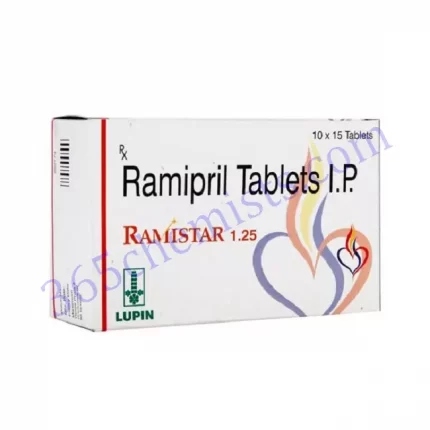Ramistar 2.5mg Tablet (Ramipril 2.5mg): Managing Hypertension and Heart Failure
A tablet known as Ramistar 2.5mg contains 2.5 milligrammes of ramipril, which is an angiotensin-converting enzyme (ACE) inhibitor. This medication is used to treat high blood pressure. The treatment of hypertension, also known as high blood pressure, as well as heart failure frequently calls for its administration. Ramistar helps to relax the blood vessels and widen them, which in turn lowers the patient’s blood pressure and improves the circulation of blood throughout the body.
How Ramistar Works
The action of the angiotensin-converting enzyme, which plays a significant part in the production of angiotensin II, is inhibited by the Ramistar 2.5 mg tablet, which enables the medication to work. Angiotensin II is a hormone that is responsible for the narrowing of blood vessels and the stimulation of the release of aldosterone, which is another hormone that is responsible for the retention of salt and water. The action of angiotensin II is blocked by ramipril, which results in a reduction in the constriction of blood vessels, a decrease in blood pressure, and a reduction in the amount of work the heart has to do.
Indications for Use
- Hypertension is the primary indication for the use of the Ramistar 2.5 mg tablet, and it is used to treat hypertension. Hypertension can lead to serious health complications if it is not controlled; some of these complications include heart disease, stroke, and problems with the kidneys. As a result of its ability to bring down blood pressure, Ramistar contributes to a reduction in the risk of these complications and promotes overall cardiovascular health.
- Heart Failure: The Ramistar 2.5 mg tablet may also be used for the treatment of patients who are experiencing heart failure. When the heart is unable to pump enough blood to meet the demands of the body, a condition known as heart failure can develop. Ramipril helps to improve the ability of the heart to effectively pump blood, which relieves symptoms such as fatigue, shortness of breath, and fluid retention.
Dosage and Administration
Individual patient characteristics, such as blood pressure levels and response to treatment, should be taken into consideration when determining the appropriate dosage of the Ramistar 2.5 mg tablet. This should be done by a medical professional. Oral administration once daily, either with or without food, is the typical method of administration. It is essential, for the best possible outcomes, to take the dosage exactly as directed.
Related Product
Ramistar 1.25mg Tablet
Ramistar 2.5mg Tablet
Ramistar 5mg Tablet
Ramistar AM 2.5mg Tablet
Ramistar AM 5mg Tablet
Ramistar H 10mg Tablet
Ramistar H 2.5mg Tablet
Ramistar H 5mg Tablet
Ramistar M XL 25mg Tablet
Ramistar M XL 50mg Tablet
Ramistar 10 Tablet
Warnings and Precautions
- Ramistar is not recommended for use during pregnancy because there is a possibility that it could harm the unborn child. However, it is safe to use while breastfeeding. During your treatment with this medication, you should immediately inform your healthcare provider if you become pregnant. It is also not recommended to use Ramistar if you are breastfeeding because there is a possibility that the medication will get into your milk and cause problems for the baby.
- Problems with the Kidneys and the Liver Patients who already have kidney or liver problems should proceed with extreme caution when taking Ramistar. Because the kidneys and liver are the primary organs responsible for the medication’s elimination from the body, the dosage may need to be altered, or alternative treatment options may need to be investigated.
- Rare cases of angioedema, a severe allergic reaction, have been reported with the use of Ramistar. These cases were caused by an allergic reaction to the drug. Seek immediate medical attention if you experience swelling of the face, lips, tongue, or throat, in addition to difficulty breathing or swallowing, as these symptoms may indicate an allergic reaction.
Possible Side Effects
The Ramistar 2.5 mg tablet, like any other medication, has the potential to cause adverse effects in some people. Some examples of common adverse effects include:
Symptoms such as lightheadedness or dizziness
Hacking cough
Headache
Fatigue
Nausea
Upset stomach
Skin rash
These adverse reactions are typically mild and go away as the body becomes accustomed to the medication being taken. However, you should contact your healthcare provider immediately if any of these side effects continue or become worse.
Drug Interactions
It is imperative that you inform your healthcare provider about any and all medications you are currently taking prior to beginning treatment with the Ramistar 2.5 mg tablet. There is a possibility that ramipril could have an effect on the efficacy of other medications, or that the risk of their side effects could be increased. Some examples of common drug interactions are as follows:
- Non-Steroidal Anti-Inflammatory Drugs (NSAIDs): Non-steroidal anti-inflammatory drugs (NSAIDs), including ibuprofen and naproxen, have the potential to counteract the blood pressure-lowering effects of ramipril.
- Potassium-Sparing Diuretics: Taking ramipril together with a potassium-saving diuretic like spironolactone may raise the risk of hyperkalemia, which is a condition in which the blood contains an excessive amount of potassium.
- Ramipril may cause an increase in the blood levels of lithium, which is a potentially harmful substance. If both of these medications are being taken at the same time, it is imperative that the lithium level be checked regularly.
- It is essential to have a conversation about the possibility of drug interactions with your healthcare provider in order to use Ramistar in a manner that is both safe and effective.
Patient Counseling and Lifestyle Modifications
Alterations to one’s way of life, in addition to the use of medication, are an essential component in the management of both hypertension and heart failure. Patients who are taking a tablet of Ramistar 2.5 mg ought to be advised to:
- Maintain a Healthy Diet: Advocate for a diet that is abundant in fruits, vegetables, whole grains, lean proteins, and dairy products with a lower fat content. Reduce your intake of sodium, and try to stay away from foods that are high in saturated fat and cholesterol.
- Participate in Frequent Physical Activity Participating in frequent physical activity, such as brisk walking, swimming, or cycling, can assist in the control of blood pressure, improvement of heart function, and overall improvement of cardiovascular health.
- Put out that cigarette! Smoking is one of the most significant risk factors for cardiovascular disease and can make the effects of hypertension even worse. Patients should be encouraged to quit smoking, and resources for support in quitting smoking should be provided if necessary.
- Reduce Your Alcohol Intake Excessive drinking of alcohol can lead to an increase in blood pressure as well as an interference with the effectiveness of antihypertensive medication. Give your patients the advice to drink alcohol in moderation or to abstain from it entirely.
- Take steps to manage your stress: hypertension has been linked to long-term stress. Encourage people to participate in activities and hobbies that help them relax and unwind, such as deep breathing exercises, meditation, or hobbies and activities that they enjoy doing.
Conclusion
An effective medication for the management of hypertension and heart failure is the Ramistar 2.5mg tablet containing ramipril 2.5mg. This helps reduce the risk of complications associated with these conditions and promotes overall cardiovascular health as it lowers blood pressure and improves heart function. In addition to taking medication, making changes to one’s lifestyle, such as quitting smoking, becoming more physically active on a regular basis, and learning how to better manage stress, are essential for achieving the best possible results from treatment. It is essential, in order to receive personalised guidance and monitoring, to take the medication in the prescribed quantity and to consult with a medical professional on a regular basis. If administered correctly, Ramistar has the potential to make a significant contribution to the patients’ overall health as well as their cardiovascular health.












